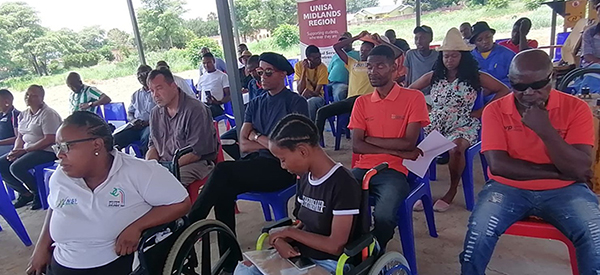Unisa’s Midlands Region Embarks on Collaborative Endeavors with Local Communities
Educational Specialist: Curriculum Development and Transformation, Dr Antonia Makina, indicated that the goal of the Tirisano project is to enhance existing collaborations and cooperation between Unisa and its communities. She explained that the project exists to ensure that individuals experience good well-being, encompassing good thinking, good living and good mental health.

Dr Antonia Makina, Educational Specialist: Curriculum Development and Transformation
Makina highlighted mental health and a high rate of unemployment as some of the issues that are negatively affecting societies. She said society is experiencing a lot of mental health challenges, especially among the youth who are not resistant enough to the challenges arising from their communities. She stated that youth should either be employed, be entrepreneurs, be involved in other projects or think about establishing projects that can create jobs and employ others.
Makina advised beneficiaries to make sure that the projects they are involved in are sustainable and continuous. Furthermore, Makina urged the beneficiaries to have clear goals, be capacitated and do things properly in a coordinated manner.
As part of the feedback, Unisa staff and representatives from the Tsholetsa Disability Centre made presentations on, among others, financial management and bookkeeping, sign language interpretations and basic computer skills.
Joel Sekorobele, a beneficiary at the centre, explained that the pottery items manufactured by beneficiaries at the centre allow them to express themselves in the creative space. The beneficiaries are equipped with the necessary skills to participate in special projects. Sekorobele said that if there are no appropriate criteria for certain individuals, criteria will be designed for them to enable them to participate. “We tailor-make programmes that are suitable as per individual capabilities,” he concluded.

Joel Sekorobele showcasing the pottery items created by beneficiaries at theTsholetsa Disability Centre
Mbodi Khorombi, Head: Facilitation of Learning, lauded the progress that the community has made in implementing the knowledge and skills shared with them, which included land preparation, which vegetables to grow in each season and when to harvest the vegetables.
“This shows that we have achieved our goal to see the community being self-sufficient and learning how to grow and harvest vegetables on their own,” he said. He urged the community to benefit from the vegetable garden by harvesting and getting nutrition for themselves, selling surplus, and taking accountability for what was sold.

A beneficiary demonstrates how to plant vegetables
The meeting was interactive as all stakeholders identified areas that need to be included in planning for 2024. Participants had the opportunity to tour the centre and visit the garden where a demonstration of vegetable-planting was presented.

